University of California Press, one of the most distinguished university presses in the United States, enriches lives around the world by advancing scholarship in the humanities, social sciences, and natural sciences. Its activities are supported by the UC Press Foundation and by philanthropic contributions from individuals and institutions. For more information, visit www.ucpress.edu. University of California Press Oakland, California 2015 by Peter Green Library of Congress Cataloging-in-Publication Data Homer, author. [Iliad.
English] The Iliad / Homer; a new translation by Peter Green. p. cm. Includes bibliographical references. ISBN 978-0-520-28141-7 (cloth, alk. paper) ISBN 978-0-520-96132-6 (electronic) 1.
Achilles (Greek mythology)Poetry. 2. Trojan WarPoetry. 3. Epic poetry, Greek. I.
Green, Peter, translator I. Title. PA 4025. A 2 G 75 2015 883.01dc232014038401 Manufactured in the United States of America 24 23 22 21 20 19 18 17 16 15 10 9 8 7 6 5 4 3 2 1 In keeping with a commitment to support environmentally responsible and sustainable printing practices, UC Press has printed this book on Natures Natural, a fiber that contains 30% post-consumer waste and meets the minimum requirements of ANSI/NISO Z 39.48-1992 ( R 1997) ( Permanence of Paper ). , . .
He is a blind man, and lives on rocky Chios: All his songs will be supreme, now and forever. Homeric Hymn to Delian Apollo, 17273
Preface
This book is the improbable fulfillment of a dream that has haunted me ever since the middle of the twentieth century, when I was one of the team Donald Carne-Ross assembled to produce some new versions of Homers Iliad on the (now long defunct) BBC Third Programme. Creative outreach was our watchword; we were targeting a postwar generation, mostly ex-service, that knew no Greek but was hungry for the classics. But in my case the magic went far further back: to Andrew Langs marvelous Tales of Troy and Greece read in childhood; to the Greek I began to learn when I was ten years old; to the well-thumbed India-paper red cloth volume of Monro and Allens third edition of the Iliad , which I had read from cover to cover by the time I was fifteen, and which went with me through three monsoons in India and Burma during World War II (and sits by me as I write these words, its pages crinkled from oppressive humidity and still smelling of the Arakan). When I finally got to Cambridge in 1947 it was a piece of providential luck that in the year I took Part II of the Classical Tripos, the annual revolving sequence of genres had reached Epic. I still have my ancient, battered copy of Walter Leafs commentary, annotated throughout with my (mostly embarrassing) undergraduate comments.
When, a few years later, with a Ph.D. in hand, I joined Carne-Rosss team, I saw the translations I did then as preparation for a full version of my own. Of course, it didnt happen. A mass of other work got in the way. I married, had children, was caught up in endless responsibilities. The best part of a decade in Greece saw me productive in many ways, but not regarding Homer.
Even when, at long last, I gravitated back by a somewhat circuitous route to teaching at university level, and became a professor of classics, other passions, mostly historical, monopolized what little spare time I had. From time to timenot least when I saw yet another version of the Iliad or the Odyssey collecting tribute in the headlinesa sad twinge of regret, a sense of opportunity lost, would nag at me, to be dismissed as self-indulgent romantic nostalgia. Even when I retired, the old dream still seemed a classic case of the If only syndrome. I suspect, though, that my subconscious may have been quietly at work: I was aware, for example, when in 1996 I translated Apollonius Rhodiuss Argonautika , that in tackling the myth of Jason and the Golden Fleece I was responding to a passion first ignited, like that for the Trojan War and the subsequent adventures of Odysseus, by Andrew Langs retelling of both: his words had fired my imagination, as a child, in an unforgettable way. What that experience also gave me was a fresh lesson, and an extremely useful one, in how to deal, as a translator, with the unrelentingly tricky problem of the epic hexameter. But it was only a year ago, when I realized that on my next birthday I was going to be ninety, that I asked myself what I had to lose, even now, by tackling the Iliad; and in a curiously relaxed mood sat down and tried my hand at book 1.
What, of course, I eventually discovered was the reason I had waited so long. In one way and another, my whole career had been a preparation for this moment. What would work for Homer in translation? Of all that I had done over half a century earlier for the Third Programme, I kept a grand total of three lines. When it came to presenting the Iliad to a modern, Greekless audience confronting ancient epic for the first time, Homer proved a more challenging taskmaster than I could ever have imagined: and yet to meet that challenge was something I found continually enjoyable and exciting. Preserving the strangeness, yet in an acceptable way; finding the mot juste for difficult and often alien concepts; matching the wonderful linear rhetoric, both in speeches and descriptive passages; keeping the simplicity while always acknowledging the emotional subtleties; writing rhythms that could, like the original, be declaimed aloud, and hold the attention of a listening audience; perhaps, above all, resisting the temptation to make nonexistent equations with easily recognizable English patternsall this tested my skills to the utmost, and too often defeated my best efforts, forced me to settle for a compromise. Perhaps that is the best any translator can hope for.
To one nagging minor problem, the spelling of Greek proper names, I have found no altogether satisfactory solution, and probably none exists. The problem itself is one legacy of Romes complete cultural domination of the European classical tradition from the Renaissance until well into the nineteenth century, which dictated (among much else), not only that Greek names be Latinized, but that the gods of the Greek pantheon should be replaced in translation by their nearest Roman equivalents. The second practice was reluctantly abandoned only after about 1880; the first is still very much with us. It is not just a matter of replacing -os and -on terminations with -us and -um ; k with c; short u with y ; and the diphthongs -oi with -oe , - ei with , and -ou with . The Latin -er termination is also imposed, so that Alxandros becomes Alexander, and Teukros Teucer. For the most part (but not invariably: for example, I use Achilles rather than Akhilleus), I have gone back to the Greek spelling.
In a majority of cases this does not make for a wrenching unfamiliarity. But the shift from Roman Hecuba to Greek Hekab or from Roman Ajax to Greek Aias can be disconcerting, and there are some Hellenismsfor example, Oidipous for Oedipus, Myknai for Mycenae, Krt for Cretethat take some getting used to. But one has to start getting rid of this wretched Latin legacy somewhere. Now the work is done, and out of my hands, I suppose I should be relaxing; but the truth is, I find myself getting more and more involved in the not quite identical problems confronting a translator of the Odyssey: I suspect my tussle with doing Homer justice is not over yet. Meanwhile I would like to take this opportunity of thanking my publishers at the University of California Press for their confidence in supporting yet another versio of the Iliad; the students who, over long years, most often without realizing it, sharpened my sense of how to look at Homer; my copy editor and old friend Peter Dreyer for, once again, his lynx-eyed common sense; and another good friend, Barbara Hird, for not only so generously agreeing at very short notice to execute a most complex index for me but also for spotting a number of errors that had got past all the rest of us. I am likewise extremely grateful to my in-house editors, Eric Schmidt and Cindy Fulton, whose professional aplomb when dealing with a challenging manuscript has been beyond all praise.

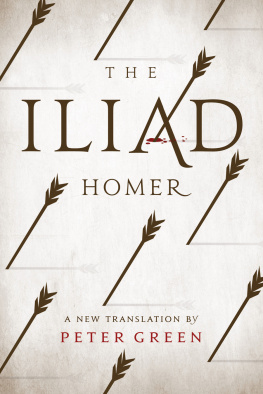

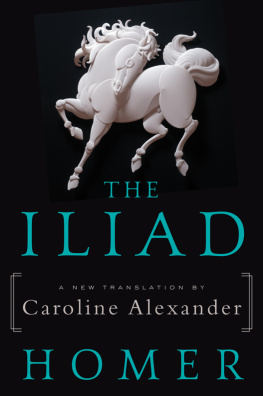
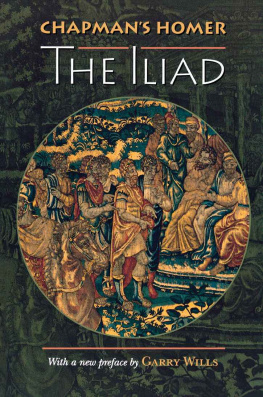
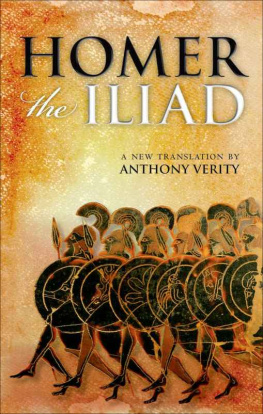
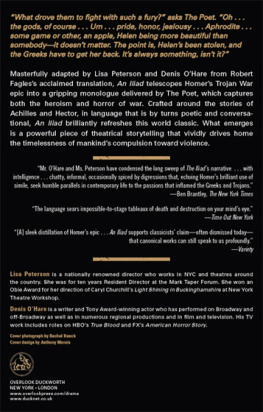
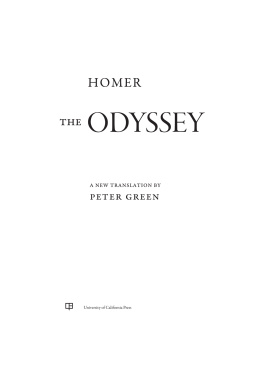
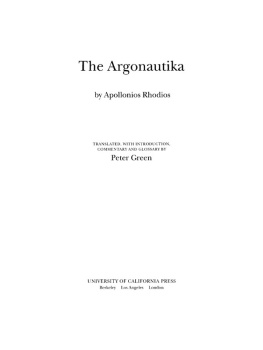
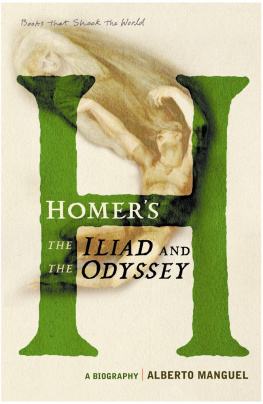
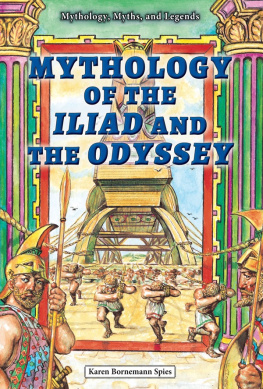
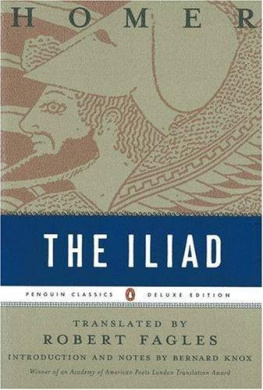

 UNIVERSITY OF CALIFORNIA PRESS
UNIVERSITY OF CALIFORNIA PRESS